The political turmoil in Bangladesh has hit bilateral trade, reflected in the volume of trade through land ports in Bengal since August 5, the day when the Sheikh Hasina government fell.
Export and import activities, which began to decline in July due to the political turmoil, hit an alarming low in August, traders said.
“Bilateral trade between India and Bangladesh through land ports is challenging now. Political unrest, reports of attacks on minorities and the dollar crisis (in Bangladesh) have hindered growth. We hope today’s (Monday’s) talks will lead to improvements next month,” said a trader in Calcutta, referring to India’s foreign secretary Vikram Misri meeting with his Bangladeshi counterpart Mohammad Jashim Uddin in Dhaka.
While cargo movement has stabilised somewhat, the possibility of an increase in trade volume remains uncertain, despite India’s ready infrastructure, including the Maitri Dwar, a dedicated cargo movement gate at the Petrapole land port.
In late July and August, export-bound cargo movement through Petrapole dropped to a dismal 158-300 trucks per day, compared to 39-200 arriving from Bangladesh.
At present, around 400 export-bound trucks cross the border daily, while 150 trucks bring in imported goods from Bangladesh.
Traders claim political instability, communal tensions, and a severe dollar crisis continue to pose significant challenges.
Bangladesh, India’s largest trading partner in South Asia, typically imports Indian textiles, agricultural goods, and machinery.
However, the student-led anti-government movement that led to Hasina’s ouster has left the Muhammad Yunus-led interim government grappling with violent political confrontations and a fragile economy.
Key trade corridors like Petrapole-Benapole, Changrabandha-Burimari, Mahadipur, and Hili have seen sharp declines in activity, hurting businesses on both sides of
the border.
The situation at Mahadipur remains unstable. Before August, around 350 trucks carried export goods — mainly grains and vegetables — daily, generating ₹26 crore in trade.
This figure has plummeted to 150 trucks and a paltry ₹13 crore on a daily average now.
The dollar crisis in Bangladesh has further exacerbated trade disruptions. A severe shortage of foreign currency is affecting both imports and exports, leading to delays and cancellations. The dollar shortage, combined with political instability, has slowed port operations, leaving many shipments stranded.
Federation of Indian Export Organisations (FIEO) Eastern Region chairman Sushi Patwari called the situation “alarming,” citing delayed payments from Bangladeshi importers.
“Trade has slowed considerably due to delayed payments, affecting exporters’ cash flows and future business,” Patwari said.
Since August, many industries in Bangladesh have shut down, with traders citing threats and violence against those associated with the previous Awami
League government.
Exporters at land ports like Petrapole, Ghojadanga, and Hili are feeling the brunt.
Sanjib Mondal, a clearing and forwarding agent at Ghojadanga in North 24-Parganas, noted that many cargo shipments remained stuck at ports due to financial issues.
“There is demand for exports, but traders fear payments getting defaulted. We cannot take such big risks,” Mondal said.
The Bangladeshi dollar crisis has made importing essential goods from India difficult, traders added.
The depreciation of the Bangladeshi Taka against the dollar has raised import costs, eroding profit margins.
Kartick Chakraborty, secretary of the Petrapole Clearing Agents’ Staff Welfare Association, said: “The number of trucks carrying steel and iron has fallen. Only essential goods are being exported to Bangladesh. Political tension is a significant barrier.”

